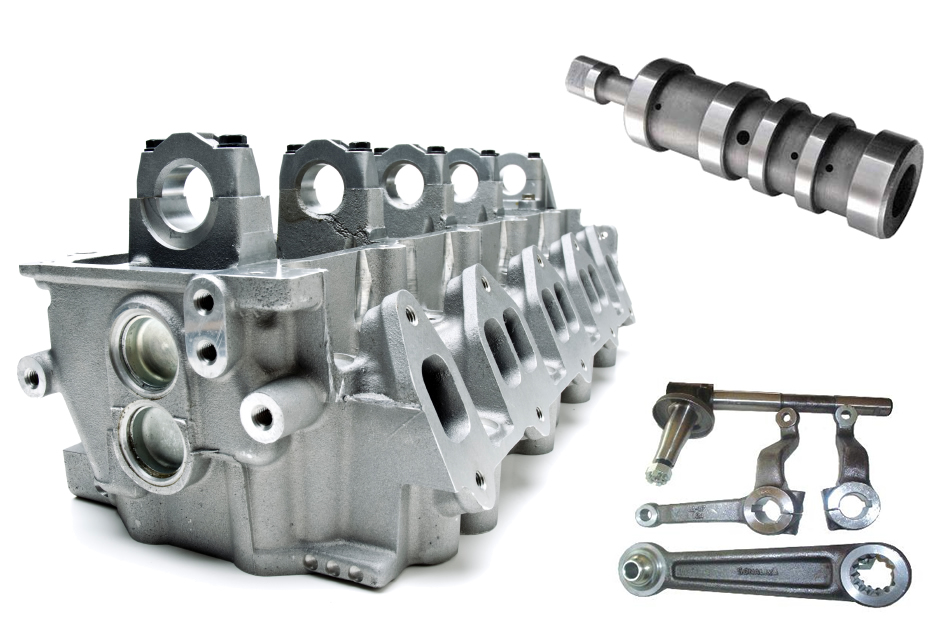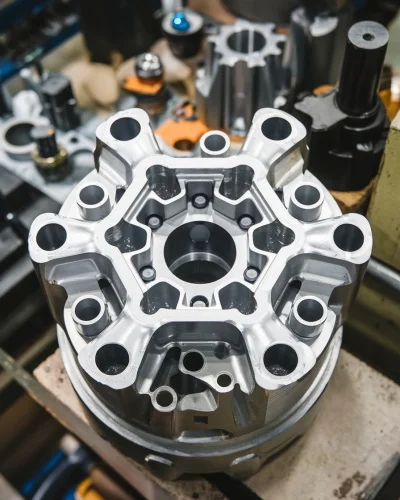Aluminum Casting Company solutions for large-scale manufacturing projects
How Aluminum Foundries Contribute to Different Industries: A Detailed Review
Aluminum foundries function as necessary vendors throughout numerous fields, including vehicle, aerospace, building, and electronics. They produce parts that are not only light-weight but additionally sturdy, enhancing the efficiency of various items. With innovative casting methods and a dedication to sustainability, these factories are adapting to fulfill advancing industry needs. As they innovate, the effect of light weight aluminum castings on different applications elevates important inquiries regarding the future of production. What exists in advance for this crucial industry?
The Duty of Aluminum Foundries in the Automotive Sector
As the auto sector progressively welcomes lightweight products to improve fuel performance and performance, light weight aluminum foundries play a crucial duty in this development. These centers specialize in the production of aluminum castings, which are necessary elements in contemporary cars. By supplying high-strength, light-weight components, light weight aluminum factories allow makers to lower the total weight of cars, eventually leading to improved gas economy and reduced emissions.
Light weight aluminum's resistance to corrosion even more improves lorry durability, making it an appealing selection for automakers. Factories make use of advanced methods such as die casting and sand spreading to develop specific and complex elements, making sure that they satisfy rigid market standards. In addition, the ability to recycle aluminum effectively adds to a more sustainable manufacturing procedure. As the vehicle industry continues to innovate, aluminum shops will remain crucial in supplying the products needed for the future generation of cars, supporting both performance and environmental goals.

Aerospace Applications of Light Weight Aluminum Castings
Light weight aluminum spreadings are integral to the aerospace sector, supplying a mix of lightweight strength and toughness that is essential for airplane efficiency. These spreadings are utilized in various elements, such as engine components, architectural frames, and touchdown equipment, where weight reduction is essential for fuel effectiveness and total safety and security. The flexibility of aluminum allows for complicated geometries that enhance aerodynamic effectiveness while preserving structural integrity.
Additionally, developments in casting technologies have enhanced the precision and surface finish of aluminum elements, decreasing the requirement for extensive post-processing. This effectiveness not only speeds up manufacturing timelines yet likewise decreases prices, making light weight aluminum an eye-catching choice for manufacturers. The rust resistance of aluminum guarantees longevity and reliability in harsh operating environments, additionally establishing its role in aerospace applications. As the sector develops, light weight aluminum spreadings continue to be an important material, driving innovation and supporting the development of next-generation airplane.
Building Industry Innovations Via Light Weight Aluminum
The building and construction sector has actually increasingly adopted light weight aluminum because of its lightweight properties and adaptability, paralleling its effective applications in aerospace. Advancements in light weight aluminum style have actually led to more powerful, more reliable structures, making it possible for building contractors and designers to discover new possibilities. The product's resistance to rust and low upkeep requires make it particularly appealing for both domestic and industrial tasks.
Light weight aluminum's versatility promotes the production of detailed layouts, enabling aesthetic improvements that were previously challenging with typical products. Prefabrication strategies have actually also developed, making use of aluminum to lower building time and prices significantly. In addition, the power performance of light weight aluminum systems-- such as home window frames and roof covering-- adds to sustainable structure techniques, lining up with modern ecological requirements. As the construction sector remains to welcome these innovations, light weight aluminum's role is anticipated to increase, driving more technology and adding to the growth of resistant infrastructures.
Electronics and the Need for Lightweight Light Weight Aluminum Parts
With the fast advancement of modern technology, the demand for lightweight aluminum parts in the electronic devices field has actually risen. As devices become a lot more compact and mobile, makers look for materials that supply both resilience and weight reduction. Light weight aluminum, with its superb strength-to-weight proportion, has emerged as a preferred choice for parts such as cases, heat sinks, and architectural supports.
Making use of aluminum not only improves item efficiency yet additionally contributes to energy effectiveness, as lighter gadgets call for less power throughout procedure. In addition, light weight aluminum's superb conductivity makes it perfect for electronic applications, making sure effective heat dissipation and decreasing the danger of getting too hot.
As customer preferences shift in the direction of lightweight and streamlined gizmos, aluminum shops play an essential duty in satisfying the developing demands of the electronic devices industry (Precision my review here aluminum casting). Their ability to produce precise and top quality light weight aluminum elements sustains innovation, making it possible for makers to press the boundaries of layout and performance
Lasting Practices in Light Weight Aluminum Foundries
As the electronic devices sector significantly focuses on sustainability, light weight aluminum shops are adapting their practices to align with these environmental objectives. Many factories are carrying out reusing programs that redeem light weight aluminum scrap, significantly decreasing the need for resources and reducing waste. By using energy-efficient innovations, these facilities are reducing their carbon footprint; as an example, utilizing electric heating systems as opposed to typical gas-fired ones can result in considerable energy savings.
Furthermore, light weight aluminum factories are spending in water conservation actions, such as closed-loop systems that reuse water used in cooling down procedures. These practices not just try these out lower water intake however additionally mitigate the ecological effect related to wastewater discharge. Additionally, many factories are checking out sustainable energy resources, such as solar and wind power, to fulfill their power needs sustainably. With these initiatives, light weight aluminum shops exemplify a dedication to ecological stewardship while continuing to fulfill the demands of the electronic devices industry.
Future Fads in Light Weight Aluminum Shop Technologies
Emerging innovations are positioned to transform aluminum factories, improving efficiency and product top quality while progressing sustainability efforts. Technologies such as artificial knowledge and artificial intelligence are anticipated to maximize production processes by forecasting equipment failings and boosting resource allocation. The combination of advanced robotics will enhance procedures, lowering labor prices and minimizing human mistake.
Additive manufacturing, or 3D printing, is additionally acquiring traction, making it possible for the manufacturing of intricate geometries that were previously unattainable with traditional techniques. This shift can lead to substantial product savings and lowered waste. In addition, clever factories making use of IoT (Web of Points) modern technologies will certainly make it possible for real-time monitoring and information evaluation, promoting proactive decision-making.
The adoption of cleaner melting innovations and recycling techniques will certainly further decrease the environmental footprint of aluminum foundries, making them much more lasting. Jointly, these fads signify a future where light weight aluminum shops can run with greater effectiveness and obligation.
Often Asked Concerns
What Are the Ecological Impacts of Aluminum Foundries?

How Do Foundries Make Certain Quality Assurance in Light Weight Aluminum Spreading?
Factories guarantee quality control in aluminum casting by executing extensive evaluation processes, making use of innovative technology, conducting regular material testing, and sticking to market criteria, thus maintaining consistency and dependability in their finished products. Aluminum Casting Company.
What Is the Ordinary Life Expectancy of Light Weight Aluminum Cast Parts?
The average life expectancy of light weight aluminum actors parts normally varies from 10 to 50 visit years, depending on factors such as environmental conditions, usage, and maintenance. Correct care can significantly enhance their resilience and efficiency over time.
Exactly How Are Aluminum Alloys Selected for Certain Applications?
Light weight aluminum alloys are chosen based on variables such as toughness, rust resistance, weight, and thermal conductivity. Engineers examine the certain requirements of applications to identify one of the most appropriate alloy for best efficiency and toughness.
What Are the Safety Rules for Aluminum Shop Workers?
Safety and security policies for aluminum factory workers include individual safety equipment mandates, air flow needs, exposure limits to hazardous products, and protocols for managing liquified steel. Conformity assurances worker security and reduces wellness risks connected with shop operations.
As the automotive market progressively accepts lightweight products to boost gas effectiveness and efficiency, aluminum shops play a crucial duty in this development. As customer preferences shift in the direction of smooth and light-weight gizmos, aluminum foundries play an essential function in satisfying the progressing needs of the electronics market. As the electronic devices sector significantly prioritizes sustainability, light weight aluminum factories are adjusting their techniques to straighten with these environmental objectives. Many factories are executing reusing programs that recover light weight aluminum scrap, substantially minimizing the need for raw products and minimizing waste. Safety guidelines for aluminum factory workers consist of individual safety devices requireds, ventilation demands, direct exposure limitations to dangerous materials, and methods for handling liquified steel.